Thanksgiving week is approaching. To Rita and me, this means we are close to the date of the birthday of Joe Reres. On November 27, Joe would have been 97. After Joe died on July 4, I assembled some thoughts about our time together. With Joe’s approaching birthday anniversary, this seems like a good time to share these memories. As you celebrate Thanksgiving with friends and family, please include a toast to Joe and Barbara.
Lonnie
MEMORIES OF MY FRIEND JOE RERES
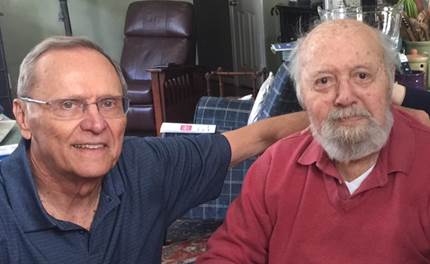
I had the pleasure of being friends with Joe Reres for the last 27 years – starting when he was 69 and ending this past July when he passed away at age 96 (1919-2016). The precise starting point was June 24, 1989, the date Joe married Barbara Westhoven. My wife Rita was Barbara’s matron of honor, reflecting a long-term friendship that started in Kansas City in the 70’s and continued after Barbara moved to Washington D.C. Rita and I met Joe once prior to the wedding date because Barbara had invited us to DC to check out this guy she might marry. Barbara was pretty sure we would like him. She was right.
Over the years, Rita and I made many trips to DC, usually staying in the city for a few days and then moving on to the Reres’ Virginia home where Joe hosted a salon in the family room. The salon was just the four of us plus their Boston Terrier who provided comic relief and owned the room when he wanted to. Joe acted as the conversation starter on a wide range of topics, and if questions came up, he could go to his large library in the living room for backup. The library was arranged by subject and included theology, classics, movies, biographies, art, philosophy, history, fiction and erotica (not a typo). Nothing on sports.
Writing: Joe’s love of reading led him to writing. His confidence in his writing skill was given a boost in 1946 when he used the GI Bill to take some courses at the University of Kansas City. Fortuitously for Joe, there was a biography course taught by guest lecturer Andre Maurois, a well-known French writer who had fled France after Hitler’s invasion (Maurois was Jewish). Maurois praised Joe’s writing, and a life-long passion was born. [Maurois returned to France after his short stay in Kansas City, but his quotes about the city are often used. When the New York Times did a piece on the city during the 1985 World Series, they quoted Maurois from his book From My Journal: “Who in Europe, or in America for that matter, knows that Kansas City is one of the loveliest cities on earth? And yet it is true.”]. Joe may have also picked up some philosophy from Maurois:

Since I did not meet Joe until he was almost 70, my familiarity with his writing talent came late. But, as Joe was fond of saying, he was a late bloomer and so his best writing was yet to come. A prime example is his autobiography that he self-published at age 89. It is amazingly comprehensive, mixing details of Joe’s life with his philosophy of life. He points out several examples of being a late bloomer: he did not learn to read until the second grade (and did that on his own and with his mother, not his teacher), did not enlist in the war until he was 23 and the U.S. had been in the war for two years, did not get laid until he was 25 or 26 (said he came to sex late, but made up for it), married the first time at 28, got his master’s degree at 63, started his own business at 70, and did not settle into the idea of striving for excellence until he was 87 or 88. I don’t agree on the last item – I am sure that started much earlier.
Joe continued to write into his 90’s. He wrote a memoir of his father’s family. He assembled a series of 28 stories that each began with a lead-in sentence or paragraph suggested by a family member or friend. In another piece, he confirmed his role as a polymath by using direct quotes to fantasize about “A Round Table Discussion” among Clara Barton, Charlie Chaplin, Noel Coward, Albert Einstein, St. Francis of Assisi, Sigmund Freud, Mahatma Gandhi, Katharine Hepburn, Carl Jung, Helen Keller, Charles Lindbergh, Nelson Mandela, Cole Porter, Joseph Reres, Will Rogers, Mother Teresa and Spencer Tracy. My favorite quote from this piece is one from Will Rogers that sounded like something Joe would say: “There are three kinds of men. The one that learns by reading. The few who learn by observation. The rest of them have to pee on the electric fence for themselves.”
Movies: Any discussion about Joe must include movies. He was a connoisseur of the highest order and had a large library of the classics. He estimated that he had viewed over 1,500 movies, and to prove the point, listed about 1,400 of them in an appendix to his autobiography. He regularly roamed the movie channel guide on cable TV and taped so many that Barbara had to keep erasing so they could tape reruns of their TV guilty pleasures, The Big Bang Theory and Jeopardy. A regular part of Joe’s salon was to pose movie trivia questions, and one of his favorites was to ask us to name the three leading men who appeared in movies with both Katharine Hepburn and Audrey Hepburn. Answer below.
To give an idea of his taste, these were his Top Ten movies: Lawrence of Arabia, Dr. Zhivago, 2001: A Space Odyssey, Dances with Wolves, Singin’ in the Rain, Gandhi, I Love You to Death, Moonstruck, Somewhere in Time and A Room With a View. We would often compare Top Ten lists (comedies, dramas, all-time) and mostly appreciated each other’s choices. But there were two in my Top Ten that he hated, even though he had never seen them. The Godfather and The Godfather: Part 2. Likewise, Joe never saw but hated what might be my favorite TV show of all time, The Sopranos. This was personal. Joe’s parents were born in Sicily, a breeding ground for the Mafia. Their families had both immigrated to New York, and after Joe’s parents married, they came face-to-face with the local version of the Mafia, the “Black Hand.” They were raising a young family and became the subject of extortion threats – they had to buy protection. This was not America to them, and so they moved to Kansas City. Joe felt the sting of this his entire life and never liked people making jokes about his Sicilian background and his possible connections to the Mafia. So, no surprise that he loved Moonstruck, a movie about Italian-Americans not in the Mafia:
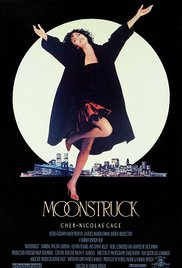
Books: Joe loved good writing, ranging from his beloved New Yorker magazine to hundreds (thousands?) of books. As his eyesight got weaker with age, he took advantage of a Library of Congress program that provided free audio books. We traded recommendations on books, and when Rita and I came to visit, Joe would often hand me a book which I was to start while there so we could discuss.
In 2012, he gave me Traitor to His Class, a bio about Franklin Roosevelt who Joe considered to be the greatest and most influential president since Lincoln. Joe grew up during the Depression and his family had tough times. He appreciated what it meant when Roosevelt was elected: Roosevelt smiled, he had elegance and understanding, he gave people hope, he exuded confidence. Roosevelt brought the country back and guided it through most of World War II. The war was finished by Joe’s favorite president, Harry Truman. Joe loved David McCullough’s definitive biography of Truman – read it when it came out and later listened to the audio version. There is further proof of Joe’s regard for these two presidents. When Joe and Barbara got their first Boston Terrier, they named him Truman. After Truman died, he was succeeded by another Boston Terrier who goes by Franklin. So, in the Reres’ dog universe, Roosevelt succeeds Truman.

Franklin
We made two visits to the Reres’ home in 2013, and on the first, Joe handed me The Patriarch, a bio on Joseph Kennedy. This book was rich in topics for us to talk about – Kennedy was variously described (sometimes wrongly) as an appeaser, isolationist, anti-Semite, stock swindler, bootlegger and colleague of mobsters, while also serving Roosevelt as the first chairman of the SEC and the first Irish-American ambassador to London. Joe and I appreciated how Roosevelt wisely used Kennedy when he needed him and ignored him when he did not. Kennedy was a success in many fields, but tragically suffered through the death of three sons.
On our second 2013 trip, it was Those Angry Days, a recounting of the nation’s internal debate from 1939 to 1941 on whether or how to stop Hitler. Joe and I had a good exchange of emails on this book. The key antagonists were Roosevelt and Charles Lindbergh, but Joe and I also appreciated the patriotic role played by Wendell Willkie who Roosevelt defeated in 1940. The same author wrote Citizens of London about three Americans in London during the same time period: Lend-Lease administrator Averill Harriman, John Winant (who had succeeded Ambassador Joseph Kennedy, sacked for his defeatist attitude) and CBS newsman Edward R. Murrow. Each of the three worked in their own way to help Churchill convince the cautious Roosevelt to come to the aid of England – and each had an affair with a Churchill daughter.
The last book Joe gave me was Lindbergh by A. Scott Berg. Joe was a fan of Berg who also wrote bios of two movie icons, Samuel Goldwyn and Katharine Hepburn, both on Joe’s library shelves. Joe had also listened to Berg’s most recent book, a bio of Woodrow Wilson. Joe was fascinated by Lindbergh. When he was 8 years old, he insisted his mother take him to see Lindbergh’s parade down Linwood Boulevard in Kansas City. He thought that the adventuresome pilot may have had the most public adulation of any American in history. Lindbergh’s life after the celebrations was not so great. The kidnapping. The fight with FDR over the isolationism of “America First.” Joe told me in an email that he had become more sympathetic with Lindbergh’s antiwar stance, but he credited that to his own growing pacifism. Joe certainly did not agree with Lindbergh’s rhetoric that bordered on racism. Joe and I pondered that 75 years had gone by and a guy named Trump had revived the term “America First” – but in his uniquely despicable way.
Following up on an article I read in the Wall Street Journal, Joe and I talked about the “Armed Services Edition” of pocket books. In World War II, publishers had cooperated to supply books to members of the armed services. These were about half the size of a normal paperback – a “small, convenient, and economical form.” In stark contrast to the Nazis’ book burnings, the army and navy distributed 120 million books under the program. I asked Joe if he had read any during his military service in the Pacific and he said he had, but did not think he had retained any. After I returned home, I went on-line and bought a used copy of the Armed Services Edition of Winter’s Tales by Isak Dinesen. I picked this title because I knew that Dinesen was an author well represented in Joe’s library and that she was also the inspiration for Joe’s writing project on storytelling, coming up next.
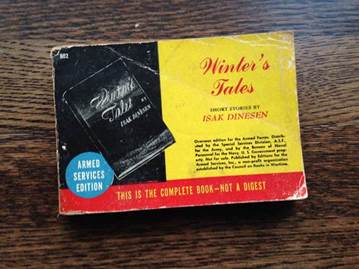
Storytelling: Joe admired storytelling, and Isak Dinesen (the pen name of Karen Blixen) of Out of Africa fame was high on his list. A wonderful scene in the movie has Karen Blixen (Meryl Streep) weaving an impromptu story for Denys Finch-Hatton (Robert Redford) based on a first line that unwinds into a journey for the mental traveler. With this in mind, Joe asked family and friends to provide him with a first sentence or paragraph to inspire “a fanciful short story (fanciful, fantastic, farcical, fraudulent, foolish…whatever ‘F’ word you decide).” He then assembled the 28 stories into a book to distribute to his first-sentence contributors. I will serve up two samples, mine and Rita’s. I proposed that he write a personal story that started like this:
“The year was 1919. In Paris, world leaders met to carve up the spoils of war. In the United States, Prohibition was ratified. And I (Joe) was born in Decatur, Arkansas. How did that all work out? The peace contemplated by the Treaty of Versailles ended in 1939. Liquor was quicker. Prohibition was repealed in 1933. As for me, I remain unended and am not a proper subject for repeal.”
It took Joe a while to write this one, and during the process, he sent this email: “Lonnie, my friend, I am struggling over a story of the Treaty of Versailles and Prohibition and me. What the fuck?? Why provide such a difficult challenge to an old fart. Just kidding. I am having fun with it. It is going slowly. Well, isn’t that surprising???!!! Hell, the fastest I can go is slow.”
Joe’s slowness was our reward as he composed a short story titled “The Roads Taken and the Roads Not Taken.” He compared what might have happened if those meeting at Versailles had been reasonable and wise rather than setting the stage for World War II. As for Prohibition, he raised one of his pet peeves – the Mafia was the big winner, not the people. Prohibition was a road that should not have been taken. As for his own life, he reviewed some of his roads taken (some smart and some not), and concluded “Thank you Lonnie, for causing me to reflect on the consequences of some things outside myself and on myself, on the consequences of roads taken and not taken, and to be more fully appreciative of the roads I did take.”
Rita gave Joe this opening sentence: “I love the smell of popcorn in the morning.” Joe was aware of our having been on safari in Africa where our guides said that if you smell popcorn on a game drive, there is a good chance of seeing a leopard. Leopards “mark” their territory by spraying the perimeter of their domain, and the odor is reminiscent of popcorn. Seeing a leopard in the wild is one of the top safari experiences and so we could not resist adapting Robert Duvall’s napalm line from Apocalypse Now.
Joe took Rita’s line and wrote “A Sensual Fable” that added various sensual pleasures to go with her first sentence. “I love the smell of coffee in the morning…the taste of orange juice…the sound of my wife singing in the morning…the sight of sunbeams in the air…the feel of my wife when I hold her and kiss her.” Joe then weaves a tale of how he is a big game “hunter” who shoots with a camera, not a gun, to supplement his wife’s articles for National Geographic. He of course loves the smell of popcorn in the morning – one of nature’s most beautiful creatures must be nearby to be photographed. This safari version of Joe sees a leopard befriend a dog from a nearby farm, leading to the lesson that peace and love can be found in many ways. The story ends with “Love is not one of the five senses. It combines them all.”
Art: Joe came early to art appreciation. As a teenager, he often went on his own to the Nelson Art Gallery after it opened in KC in 1933. He was a regular at art museums as his professional life and vacations took him around the country and to Italy. He also collected original art and says he and Barbara chose the floor plan in their home because there was a big entry hall where they could display their extensive art collection.
My favorite art story about Joe relates to one of his own paintings. When he was about 50, he took a painting course at the Corcoran Gallery in DC. He was late to his first class and walked in and found himself ten feet from a black nude model. He quickly adapted to the class and after a few weeks completed a painting of a nude pregnant lady based on concentric circles. He did not like it and so covered it with gesso to rub it out. Another student said wait a minute and wiped off the gesso to reveal a thin veil that gave the painting a nice aesthetic look. Joe framed it and hung it in his living room. When his daughter Stephanie was to be married in his home, the soon-to-be mother-in-law objected to the painting and he took it down. It was later discarded when a hole was put through the middle of the canvas during a furniture move. I wish I could have seen it.
Joe held a series of positions in advertising, administration and employee relations, but I think he most enjoyed his “late bloomer” time as an independent consultant, starting at age 70. His favorite consulting client was his first, the National Gallery of Art in DC. He enjoyed his work for the gallery on employer-employee relations, but I think he most liked the fact that he was part of one of the top art museums in the world.
Music: Joe was classical, I was rock ‘n’ roll. But we had a middle ground – Broadway shows. He repeatedly listened to the CD of Book of Mormon that Rita and I sent him after we saw the show on Broadway.
God: I think that the Book of Mormon CD spoke to Joe about organized religion – not his favorite institution. He went from a boy who thought about being a priest to believing that the guilt culture of the Catholic church was bad for society. He said he went from being a good Catholic to a bad Catholic to an ex-Catholic. His “coup de grace” was the child abuse by priests. But he was spiritual and spoke of a God who was in all things – be it mountains, oceans, flowers, people, animals and, to him, the best places: the heart, the soul, the quiet moments, alone, contemplation.
War: Most of my discussions with Joe about his war experiences seemed to take place while Rita and Barbara were away shopping (per Joe, “Barbara loves shopping almost as much as breathing”). He was proud of his service, but war troubled him, and he claimed to have become a pacifist in his old age. He realized that this was an idealist desire and knew it did not match up with his support for Truman’s ending of World War II with the atomic bomb.
Joe was a radio operator/gunner on a B-24 in the Pacific. Before entering the service, he had never fired a gun. Joe’s autobiography details the grim life of a crew in one of these “flying coffins.” But the part that haunted him most was that he may have shot down the last plane in World War II. The atomic bombs on Hiroshima and Nagasaki were dropped on August 6 and 9, 1945. The final surrender did not occur until September 10. Crews like Joe’s were to continue bombing runs after August 9, but they were not to drop any bombs or engage unless attacked. Peace was at hand. But that was not yet the case on August 8 when Joe and his crew engaged a Japanese fighter plane. When the enemy pilot was about a thousand yards away and constantly shooting, Joe fired back and killed the pilot whose plane then dropped into the ocean. Joe deeply regretted that the kill had to take place at all – a sad fluke in timing. As for Joe’s approval of Truman’s decision on the atomic bomb, he admitted a selfish reason – without those bombings, the war in the Pacific would have continued and Joe’s odds of not coming back would have greatly increased.

Joe’s history with the B-24 got us into a bomber email exchange. I had been listening to an audio version of Catch-22, and Yossarian and his pals were flying in B-25’s. Both types were dangerous, especially on landing and taking off, often depending on the load of bombs. Hence, the “flying coffins.” We dug deeper and found other B-24 crew members: actor Jimmy Stewart, Olympian Louis Zamperini (the downed bombardier in Unbroken), George McGovern, Robert Altman and Stewart Udall. Joe noted that Jimmy Stewart had also played a pilot in a movie, Charles Lindbergh in The Spirit of St. Louis. Ever the critic, Joe said Stewart was too old to play Lindbergh, but that he did a great job. As for the atomic bombs, they were delivered by B-29’s.
Prescient Joe: Joe started an exchange of emails in April of 2011:
Last night I dreamt that I had been given the most difficult and important job in the world, whether by election, popular acclaim, or by appointment I do not know, but suddenly I was tasked to solve and correct the all the economic, moral, financial and social problems of the world, and to do so pronto. And the pleasant part of the dream is that I did it. I was so brilliant, so likeable, so persuasive that the whole thing was a breeze. All the special interest politicians saw the folly of their spoiled-child stubborn positions and henceforth cooperated together cheerfully and got things right in record time. The religious zealots of all ilk recognized the profundity and love of the Divine Order and forsook the most hateful aspects of their religions and then practiced only the best aspects. The bankers, lawyers, financiers, and crass materialists laughed at their silly exploits and took vows of poverty, obedience, and chastity, but soon abandoned chastity as being antithetical to true spirituality. Of the whole loutish lot of media moguls who had been dumbing down America, I singled out the Cassandra and/or Pollyanna newscasters, who saw the idiocy of their infantile hawkings and replaced them with the likes of Doris Kearns Goodwin and Ken Burns to report on what was happening. The overpriced entertainers and sports figures renounced Satan and all his works, and tied themselves straight away to the classrooms to help kids expand their vision and understand things better. The extremely rich and extremely poor got together for a love fest at Woodstock and traded places with sometimes hilarious but general beneficial results. I did it all in less than half an hour of dreaming. Pretty good, eh?
Rita and I both responded and I noted that Joe should be elected President, but he demurred:
Rita dear, I, too, am looking forward with great pleasure to yours and Lonnie’s visit, but we shall not be working on the implementation plan for my dream. As I told my son Tom I am going to leave those details up to others.
Lonnie, it is kind of you to propose me for prez but I must decline. The way things are going I might be running against the likes of Donald Trump and/or Sarah Palin, in which case I think I would become dangerously uncivil.
Your dreamy friend, Joe
[So, as you can see, Joe was worried in 2011 that someone as bad as (or worse than) Palin might be a future Republican nominee for President. The absurd became reality]
Joe at 95: In early November of 2014, Rita and I visited friends in Naples, Florida. We went to the local zoo which was celebrating its 95th anniversary. There were posters to recognize the event, and we liked one with a lion and thought it would be a cool thing to show Joe who was also turning 95. And then Rita got an even better idea – she took a photo of Joe from one of our past trips and had a memorable birthday gift created for Joe (he liked it a lot):
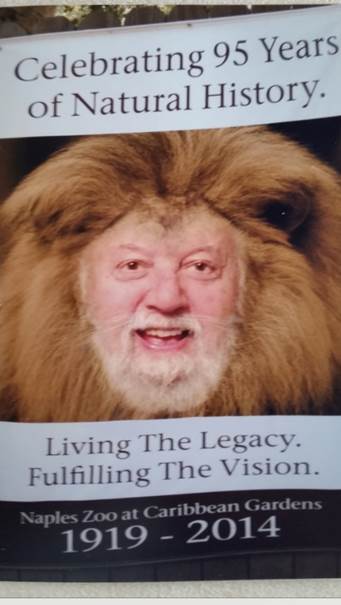
Baseball: Until Joe was almost 95, he showed little interest in baseball. Or any sport for that matter – remember from above, no books on sports in his library. But he came around a little on baseball, yet another example of his being a late bloomer. It no doubt helped that Kansas City (his childhood home) fielded the winning Royals in the 2015 World Series. He followed email posts that I sent out during that Series, and he then subscribed to my post-Series newsletter (the “Hot Stove”). The Hot Stove was really meant for baseball nerds, mostly coverage of trivia and nostalgia on baseball, but Joe said he liked the writing (made me feel good). He was definitely pleased when I pointed out in a post that my oldest Hot Stove reader was a 96-year-old in Virginia.
Roger Angell nurtured this process. In 2014, I sent Joe a copy of “This Old Man,” an article by the then 93-year-old Angell in the New Yorker. Although Joe was a long-time subscriber to the magazine, he had passed over the Angell articles in the past because most were about baseball. As many fans know, Angell’s prose about baseball reads like poetry. But “This Old Man” was not about baseball – it was about growing old and was so well written that it was widely read online. Joe loved the writing and was hooked, and he was pleased to see a fellow nonagenarian doing such good writing. It gave me great pleasure to introduce Joe to a new author. When the piece became the title article for a collection of Angell’s essays, Joe got the audio version and listened to all of the articles, many of which were about baseball. Baseball was also the subject of Joe’s last email to me (April 17, 2016):
Dear Lonnie —
Ken Burns is a national treasure.
We enjoyed his two-part tribute to Jackie Robinson not only, of course, as a source for me of new information–I knew him as the first black MLB player–but I did not know he was such a wonderful activist. I was also surprised that he played for the KC Monarchs before he went to the Dodgers.
Looking forward with much anticipation to seeing you and your incredible wife in June.
Your old friend (and the oldest Hot Stove reader)
Joe
Barbara: Joe loved Barbara and Barbara loved Joe, but neither at first sight. A couple of dates in late 1985 produced no interest and absolutely “no sparks” (as specifically described by Joe in his autobiography and confirmed by Barbara). Eight months passed before they went out again. Both had broken up with their significant other and decided to go out and enjoy each other’s company. Barbara was planning on returning to Kansas City when her boss Tom Eagleton retired from the Senate at the end of 1986. They found themselves getting serious without planning to but Barbara considered Joe a bit of a flake. Then Joe gave her the Myers-Briggs Temperament Indicator. This is a personality preference concept based on a theory originated by Carl Jung – that we seek out our significant others to complement us. The test looks at traits like introvert/extrovert, sensing/intuition, thinking/feeling and judging/perceiving. Joe said Barbara was a strong ESTJ under the test. He was mostly the opposite. She had qualities that he lacked. Barbara saw there was some basis for his “nonsense” and “as they say, the rest is history.”
He bragged about Barbara’s talents and thought her work history was a good indicator. She primarily worked as an executive assistant for only two men in her life, both with ambitions to be President. The first was Senator Tom Eagleton who she served in both Kansas City and DC. Her next position was with former Senator Birch Bayh in his DC law office. Joe’s opinion: either boss would have been preferable to Reagan and the two George Bushes.
Barbara and Joe shared movies, books, the Washington Post, the New Yorker, The Big Bang Theory and so many other things. She often read to him, especially after his eyes became weaker. They talked a lot. Joe’s writing mentor provides an apt description:
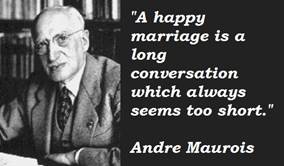
Our Final Visit: Rita and I set up our regular visit to match up with the Reres’ 27th wedding anniversary (June 24, 2016). Truth be told, we were worried about Joe’s health and wanted to be sure to see him again. He had a major setback that had put him into rehab, but he was back home. Barbara had retired some months earlier, but she needed aid from health care workers as Joe’s mobility had declined. Although Joe tired more easily, our conversations were, as always, lively and diverse. Joe’s opinion of Trump was even worse than it had been in 2011, and he kept his promise of being uncivil about that. On June 24, we toasted their 27th with champagne. Here is Joe that evening with his wife and her matron of honor:
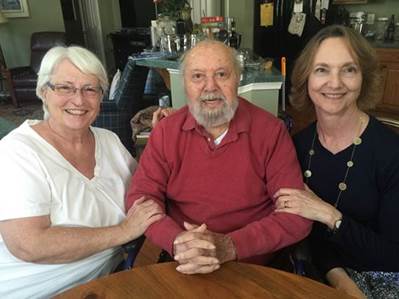
In keeping with our usual agenda, we watched a classic movie, My Fair Lady. Barbara surreptitiously erased movies from the DVR so they would not bump their catalog of The Big Bang Theory. Joe again asked his trivia question on the Hepburns and their mutual leading men. The answer: Peter O’Toole, Cary Grant and Humphrey Bogart.
Rita and I were staying in the guest room in the lower level. I have mentioned Joe’s main library on the first floor, but the lower level had another store of hundreds of books, mostly paperbacks. As I snooped through the stacks, I enjoyed one of those eureka moments. I uncovered an Armed Forces Edition book that Joe had retained since World War II – he had just forgotten about it. Even better, it was an Isak Dinesen book, Seven Gothic Tales. Serendipity. Separated by some 70 years, Joe and I had each acquired a soldier’s copy of an Isak Dinesen book.
We left the Reres’ home on June 26. Notwithstanding Joe’s physical issues, he was looking forward to getting his new dentures in the coming week and also getting back to work on his novel about a B-24 crew in World War II. Rita and I went on a baseball stadium tour that returned us to Kansas City on July 3. Rita kept in touch with Barbara during our tour, and Joe soon went from home to the hospital and then transitioned back to home under hospice care. He died on July 4. We talked with Barbara about how Joe would be smiling at the date. With his love of history, he would appreciate that Thomas Jefferson and John Adams had died on July 4, 1826, exactly 50 years after the Declaration of Independence. Joe now joined them, exactly 190 years later.
RIP Joe. Our long conversation was too short.
Lonnie Shalton
September 1, 2016
Postscript: On September 19, 2016, Roger Angell turned 96. A few days later, he wrote a piece for the New Yorker about getting ready to cast his ballot for President for the 19th time. His first was in 1944 with a mail-in ballot from the Pacific Ocean where he was stationed with the Army Air Force. Just like Joe Reres. He voted for a fourth term for FDR. Just like Joe Reres. Angell says his vote for FDR was thrilling, but not as significant as his vote will be in 2016, which he believes is the most important in his lifetime. He then makes his compelling case for Hillary Clinton and the reasons he finds Donald Trump to be a dangerous alternative. Sounds just like Joe. The finish is perfect as Angell imagines a narcissistic President Trump getting a late night crises call and preparing to send out a tweet with one primary thought in mind: “How will I look?”
Joe would have loved this article. Click here.
Postscript #2: On November 8, 2016, Donald Trump was elected President. The good news is that Joe did not have to see that. The bad news is that it happened.